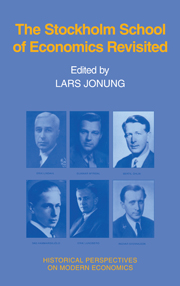Book contents
- Frontmatter
- Dedication
- Contents
- Preface
- List of Contributors
- Dramatis Personae at the end of 1937
- Introduction and Summary
- Part I The roots
- Part II The approach of the Stockholm School
- 4 Expectation and plan: The microeconomics of the Stockholm School
- 5 Sequence analysis and optimization
- 6 There were two Stockholm Schools
- 7 On formal dynamics: From Lundberg to chaos analysis
- Comment
- Comment
- 8 Lundberg, Keynes, and the riddles of a general theory
- 9 Macrodynamics and the Stockholm School
- 10 Ohlin and the General Theory
- 11 The monetary economics of the Stockholm School
- 12 The Austrians and the Stockholm School: Two failures in the development of modern macroeconomics?
- 13 The political arithmetics of the Stockholm School
- 14 After the Stockholm School
- Part III The impact of the Stockholm School
- Part IV What remains of the Stockholm School?
- The Stockholm School: A non-Swedish bibliography
Comment
Published online by Cambridge University Press: 05 July 2013
- Frontmatter
- Dedication
- Contents
- Preface
- List of Contributors
- Dramatis Personae at the end of 1937
- Introduction and Summary
- Part I The roots
- Part II The approach of the Stockholm School
- 4 Expectation and plan: The microeconomics of the Stockholm School
- 5 Sequence analysis and optimization
- 6 There were two Stockholm Schools
- 7 On formal dynamics: From Lundberg to chaos analysis
- Comment
- Comment
- 8 Lundberg, Keynes, and the riddles of a general theory
- 9 Macrodynamics and the Stockholm School
- 10 Ohlin and the General Theory
- 11 The monetary economics of the Stockholm School
- 12 The Austrians and the Stockholm School: Two failures in the development of modern macroeconomics?
- 13 The political arithmetics of the Stockholm School
- 14 After the Stockholm School
- Part III The impact of the Stockholm School
- Part IV What remains of the Stockholm School?
- The Stockholm School: A non-Swedish bibliography
Summary
The chaotic attractor of mathematical theory began with Birkhoff in 1916. The chaotic attractor of simulation experiment arrived with Lorenz in 1962. The identification of these two objects has not yet succeeded, despite many attempts during the past twenty years. Of course, everyone (including myself) expects this to happen soon.
(Abraham, 1985, p. 117; italics added)Professor Baumol has written a characteristically lucid paper that is both interesting and informative. In the limited space available I can only attempt to comment on a few of the many stimulating points he has taken up on the basis of a thorough study of Lundberg's classic doctoral dissertation.
Baumol's main points seem to be the following: in formal dynamic analysis (especially in economics, but not exclusively so, say, from Frisch and Le Corbeiller up to recent applications of dynamical systems theory) the lessons to be learned are (i) the importance of being nonlinear; (ii) the desirability of inductive generalizations on the basis of numerical simulation “experiments”; (iii) the emptiness – indeed the danger – of formal solutions of the existence-uniqueness variety. Baumol substantiates his case with a variety of useful examples and concepts ranging from structural stability and sensitive dependence on initial conditions in mathematics to evolutionary processes and business cycle models in economics. The canonical examples he has utilized are a version of a Lundbergian model of cyclical behavior and the famous quadratic map.
- Type
- Chapter
- Information
- The Stockholm School of Economics Revisited , pp. 200 - 204Publisher: Cambridge University PressPrint publication year: 1991

